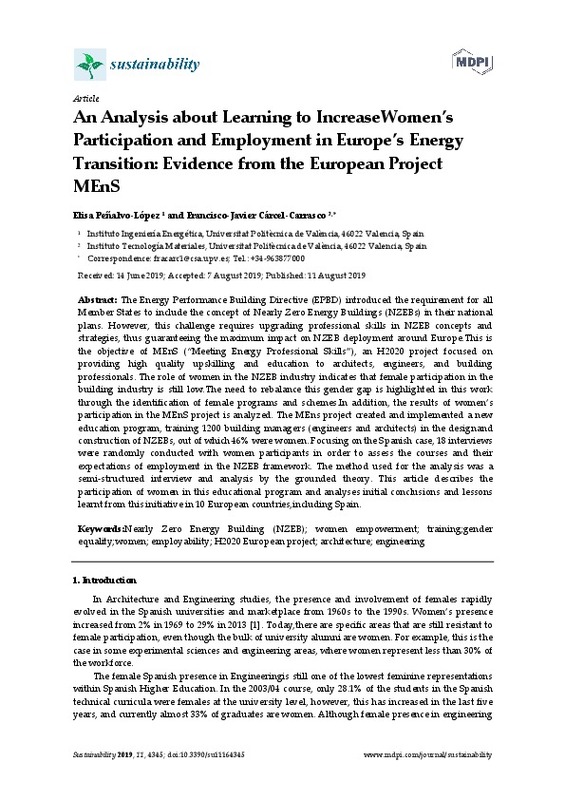http://eur-lex.europa.eu/legal-content/EN/ALL/;ELX_SESSIONID=FZMjThLLzfxmmMCQGp2Y1s2d3TjwtD8QS3pqdkhXZbwqGwlgY9KN!2064651424?uri=CELEX:32010L0031
Peñalvo-López, E., Cárcel-Carrasco, F., Devece, C., & Morcillo, A. (2017). A Methodology for Analysing Sustainability in Energy Scenarios. Sustainability, 9(9), 1590. doi:10.3390/su9091590
CARCEL CARRASCO, F. J., PEÑALVO LOPEZ, E., & DE MURGA, G. (2018). OFICINAS AUTO-SOSTENIBLES PARA LAS AGENCIAS DE AYUDA INTERNACIONAL EN ZONAS GEOGRÁFICAS REMOTAS. DYNA INGENIERIA E INDUSTRIA, 94(1), 272-277. doi:10.6036/8507
[+]
http://eur-lex.europa.eu/legal-content/EN/ALL/;ELX_SESSIONID=FZMjThLLzfxmmMCQGp2Y1s2d3TjwtD8QS3pqdkhXZbwqGwlgY9KN!2064651424?uri=CELEX:32010L0031
Peñalvo-López, E., Cárcel-Carrasco, F., Devece, C., & Morcillo, A. (2017). A Methodology for Analysing Sustainability in Energy Scenarios. Sustainability, 9(9), 1590. doi:10.3390/su9091590
CARCEL CARRASCO, F. J., PEÑALVO LOPEZ, E., & DE MURGA, G. (2018). OFICINAS AUTO-SOSTENIBLES PARA LAS AGENCIAS DE AYUDA INTERNACIONAL EN ZONAS GEOGRÁFICAS REMOTAS. DYNA INGENIERIA E INDUSTRIA, 94(1), 272-277. doi:10.6036/8507
The Architectural Profession in Europehttps://www.ace-cae.eu/
Meeting of Energy Professional Skills (MEnS) Platformhttp:///www.mens-NZEB.eu/en/
Partington, D. (2000). Building Grounded Theories of Management Action. British Journal of Management, 11(2), 91-102. doi:10.1111/1467-8551.00153
Eich, D. (2008). A Grounded Theory of High-Quality Leadership Programs. Journal of Leadership & Organizational Studies, 15(2), 176-187. doi:10.1177/1548051808324099
Glaser, B. G., & Strauss, A. L. (2017). The Discovery of Grounded Theory. doi:10.4324/9780203793206
Casey, D., & Houghton, C. (2010). Clarifying case study research: examples from practice. Nurse Researcher, 17(3), 41-51. doi:10.7748/nr2010.04.17.3.41.c7745
Eisenhardt, K. M. (1989). Building Theories from Case Study Research. Academy of Management Review, 14(4), 532-550. doi:10.5465/amr.1989.4308385
AMIT (Asociación de MujeresInvestigadoras y Tecnólogas)http://www.amit-es.org/
Gender Charterhttp://www.ecu.ac.uk/equality-charters/athena-swan/
Asociación de MujeresCientíficas y Técnicashttp://www.unizar.es/mutem/mucit.html
About WiSEThttp://www.wiset.org.uk/index.php?page=introduction
IEEE Women in Engineeringhttp://www.dinel.us.es/wie/
IEEE Women in Engineeringhttp://www.ieee.org/membership_services/membership/women/index.html
Women in Engineeringhttp://womeninengineering.org.uk/about-us/
The IET Women’s Networkhttp://mycommunity.theiet.org/communities/home/77?origin=wnmyc#.VWsFzl5N1uY
Peñalvo-López, E., Cárcel-Carrasco, F. J., Christoforidis, G. C., Nousdilis, A., Riccetti, A., Melandri, D., & Papagiannis, G. K. (2017). Upgrading Qualifications of European Energy Professionals in NZEB – The MEnS Project. Procedia Environmental Sciences, 38, 898-904. doi:10.1016/j.proenv.2017.03.177
Prix des Femmes architectes 2013http://www.calcia-infos.fr/innovations/prix-des-femmes-architectes-2013
Navarro-Astor, E., Infante-Perea, M., & Román-Onsalo, M. (2016). Revisión internacional de estudios de barreras de carrera bajo la perspectiva de género en la industria de la construcción. Innovar, 26(61), 103-118. doi:10.15446/innovar.v26n61.57169
Agapiou, A. (2002). Perceptions of gender roles and attitudes toward work among male and female operatives in the Scottish construction industry. Construction Management and Economics, 20(8), 697-705. doi:10.1080/0144619021000024989
Fielden, S. L., Davidson, M. J., Gale, A. W., & Davey, C. L. (2000). Women in construction: the untapped resource. Construction Management and Economics, 18(1), 113-121. doi:10.1080/014461900371004
Dainty, A. R. J., Bagilhole, B. M., & Neale, R. H. (2000). A grounded theory of women’s career under-achievement in large UK construction companies. Construction Management and Economics, 18(2), 239-250. doi:10.1080/014461900370861
Whittock, M. (2002). Women’s experiences of non-traditional employment: is gender equality in this area a possibility? Construction Management and Economics, 20(5), 449-456. doi:10.1080/01446190210140197
Francis, V., & Prosser, A. (2013). Exploring Vocational Guidance and Gender in Construction. International Journal of Construction Education and Research, 10(1), 39-57. doi:10.1080/15578771.2012.744371
Kaewsri, N., & Tongthong, T. (2014). Favorable Female Attributes in Relation to Career Challenges of Women Engineers in the Thai Construction Industry. International Journal of Construction Education and Research, 10(3), 222-236. doi:10.1080/15578771.2013.856825
Navarro-Astor, E., & Caven, V. (2014). The Professional Career of Spanish Architects: Obstacles and Facilitators. Construction and Building Research, 63-69. doi:10.1007/978-94-007-7790-3_9
Sang, K. J., Dainty, A. R., & Ison, S. G. (2014). Gender in the UK architectural profession: (re)producing and challenging hegemonic masculinity. Work, Employment and Society, 28(2), 247-264. doi:10.1177/0950017013491306
Sewalk, S., & Nietfeld, K. (2013). Barriers Preventing Women from Enrolling in Construction Management Programs. International Journal of Construction Education and Research, 9(4), 239-255. doi:10.1080/15578771.2013.764362
[-]









